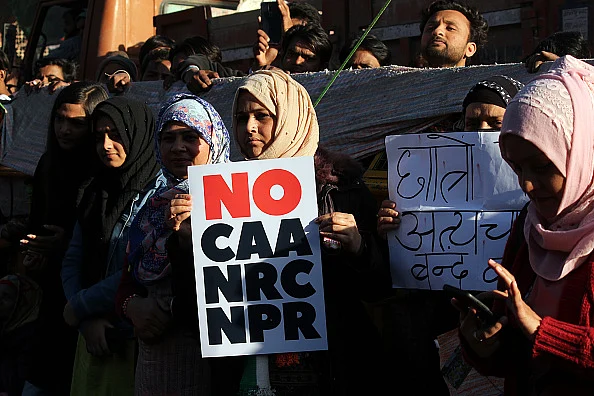The Citizenship (Amendment) Act (CAA), notified by the government on Monday, has been a source of controversy and protests in India. Aimed at providing Indian citizenship to non-Muslim migrants facing religious persecution in Bangladesh, Pakistan, and Afghanistan, the law has faced opposition and support from various quarters.
While the act was passed in 2019 and subsequently received President's assent, protests broke out in several parts of the country, with many calling it 'discriminatory'. Jamia Millia Islamia and Shaheen Bagh became epicentres of these protests.
According to the Manual on Parliamentary Work, the rules for any legislation should be framed within six months of presidential assent or the government has to seek an extension from the Committees on Subordinate Legislation in Lok Sabha and Rajya Sabha. The Home Ministry has been seeking extensions since 2020.
On December 27, 2023, Home Minister Amit Shah confidently stated that the BJP-led central government would proceed with the CAA implementation, asserting that "no one can stop it." During this declaration, Shah also took the opportunity to criticise West Bengal Chief Minister Mamata Banerjee. He accused her of practices such as appeasement, infiltration, corruption, and political violence.
Despite these occasional remarks, there had been little observable progress on the CAA until this recent development. Although the broad contours of the law were known, the specific rules required for its execution had not been officially notified.
With the government's notification on Monday, just days ahead of the announcement of the Lok Sabha elections, the rules come into force with immediate effect.
Citizenship (Amendment) Act (CAA) | Timeline
December 11, 2023: Parliament passes the Citizenship (Amendment) Bill (CAB) 2019, aimed at granting Indian citizenship to persecuted non-Muslim minorities from Bangladesh, Pakistan, and Afghanistan.
December 13, 2023: President Ram Nath Kovind gives his assent, officially constituting it as the Citizenship (Amendment) Act (CAA).
December 2019 - Early 2020: Widespread protests erupt across the country in response to the CAA.
December 15, 2019: Women of Shaheen Bagh initiate an indefinite sit-in protest in Delhi, becoming a symbol of resistance against the CAA.
December 15, 2019: BJP leader Kapil Mishra carries out a rally in support of the CAA, chanting slogans like "Goli maaron saalon ko, desh ke gaddaron ko," intensifying the rhetoric.
January 30, 2020: A minor opens fire at a group of anti-CAA protesters outside Jamia Millia Islamia, injuring a student.
February 2020: Student-led protests escalate, leading to clashes with police in various parts of the country.
February 23, 2020: Delhi witnesses communal violence, resulting in over 53 deaths and the displacement of thousands, predominantly from the Muslim community.
February 2020: In the run-up to the Delhi elections, BJP political leaders employ incendiary slogans equating protestors against CAA-NRC to anti-national elements. BJP leader Kapil Mishra issues an ultimatum, demanding the clearance of protest sites. Violence erupts shortly after his speech, resulting in fatalities, including the death of police head constable Ratan Lal.
Post-February 2020: Legal challenges emerge, with petitions challenging the constitutional validity of the CAA. The outbreak of the Covid-19 pandemic and subsequent lockdowns suppressed the protests and discussions around the CAA.
December 27, 2023: Home Minister Amit Shah asserted that no one can stop the implementation of the Citizenship (Amendment) Act as it is the law of the land and accused West Bengal Chief Minister Mamata Banerjee of misleading people on the issue. Among the many opponents of CAA, one is West Bengal chief minister and Trinamool Congress (TMC) supremo Mamata Banerjee.
January 3, 2024: Reports emerge suggesting that rules for the CAA are prepared by the central government and will be notified "much before" the announcement of the Lok Sabha elections in 2024.
January 28, 2024: Union Minister Shantanu Thakur declares at a public rally that the CAA will be implemented across all states in India within seven days. The government aims to modernise the citizenship-granting process by making it online, allowing applicants to apply even from their mobile phones. Rules for the CAA's implementation are expected to be issued before the announcement of the Lok Sabha elections.
March 11, 2024: The rules for implementation of CAA were notified on Monday, paving the way for granting of citizenship to undocumented non-Muslim migrants from Pakistan, Bangladesh and Afghanistan.


























